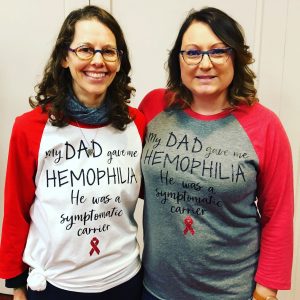Creating Conversation with a Controversial Shirt
Written by |

Raising awareness is a delicate task. Sometimes, the most effective way to promote dialogue is with a tool that is considered controversial. I understood this seven months ago when I made a T-shirt that was bound to attract both people who loved it and people who hated it. I found it fascinating to hear the conversations unfold.
This is the shirt I made.
Let me first state that men cannot be symptomatic carriers of hemophilia. I fully understand this and want my readers to, as well. This shirt is a commentary on the medical struggles women face when seeking proper hemophilia diagnosis and treatment.
When I was growing up, people believed women could not have hemophilia. Men have one X chromosome. If their X has a hemophilia mutation, they have hemophilia. Women have two X chromosomes. Medical professionals used to believe the non-mutated X would compensate for the mutated X. Women were thought to be “carriers,” passing the mutation along to their children, but not to manifest the disease.
Due to a process called lyonization, some women who carry the hemophilia mutation will also have hemophilia. How they fare during the random process of duplicate X-chromosome inactivation determines their factor levels. Their factor levels will determine whether they have hemophilia. As knowledge grew that women could have bleeding issues, they came to be called “symptomatic carriers.”
Discriminating terms
The problem with the symptomatic carrier term is the barrier to treatment it creates. Sometimes, it is dangerously confused with the term asymptomatic carrier. At other times, it is dismissed entirely. Women with the same factor VIII and factor IX levels as men received a different diagnosis. Men were receiving factor replacement, when necessary, and many of the women were not. The World Federation of Hemophilia included the diagnosis of women in its guidelines, acknowledging the struggle women were facing.
This is why I made the shirt. If a man has hemophilia, he carries the mutation and can pass it along, and he definitely has symptoms. Is this different in a woman with the same factor levels? Many women and medical professionals argue that there is no difference; diagnosis and treatment should be the same.
Many reactions
I get many reactions to my shirt, and each reaction gives tremendous insight into that person. Following are some common reactions:
- I love it!
Often, a woman with hemophilia who struggled to obtain care or a medical professional who treats women with hemophilia. - Huh? Men cannot be symptomatic carriers.
Usually, confused individuals who do not understand the struggles for equitable access to care and treatment. - You have no idea what hemophilia is like.
This has been said to me by a few men with severe hemophilia who feel women are whining and have not gone through the suffering they have (even though many women do suffer greatly due to hemophilia). - How dare you blame your dad for giving you hemophilia? I do not believe I gave my son hemophilia.
Mostly moms who have passed the mutated hemophilia gene to their child and are processing some pretty heavy guilt. While my dad did indeed give me hemophilia, I am in no way blaming him. It is something we share, and I wish he were alive to continue the fight with me. I know he would have been a huge supporter of women receiving appropriate diagnosis and care. - You are promoting bad information and confusing people.
Individuals who do not get that the shirt is political commentary. These people have a point: Out of context, it is confusing.
Lessons from a shirt
In the end, I learned a lot of lessons through my shirt. When I wear it in groups of women who are desperately seeking appropriate care, it is much appreciated. When I wear it in other circles (for example, at hemophilia conferences), I get mixed reviews from men and women alike. I need to really be aware of my audience.
It was my hope that the shirt would spark conversation about women and diagnosis, which it has. There are times when it is OK for the conversation to be heated, as tough conversations can help raise awareness. There are also times when acrimonious debate is counterproductive to a cause. Understanding the appropriate time and place for a controversial statement that potentially evokes strong reactions is key.
I personally love my shirt, and know my father would have loved it, as well. I am certain he would have made his own complementary shirt that said, “I gave my daughter hemophilia. I am a symptomatic carrier.” I wish he was around to wear that shirt, and to join me in the continued fight for all women who carry hemophilia to receive an accurate diagnosis and equitable access to care.
***
Note: Hemophilia News Today is strictly a news and information website about the disease. It does not provide medical advice, diagnosis, or treatment. This content is not intended to be a substitute for professional medical advice, diagnosis, or treatment. Always seek the advice of your physician or another qualified health provider with any questions you may have regarding a medical condition. Never disregard professional medical advice or delay in seeking it because of something you have read on this website. The opinions expressed in this column are not those of Hemophilia News Today or its parent company, Bionews Services, and are intended to spark discussion about issues pertaining to hemophilia.




Mary Haugen
Love it.